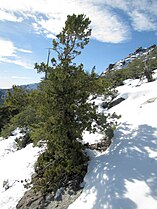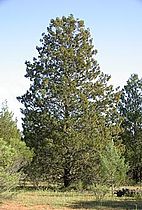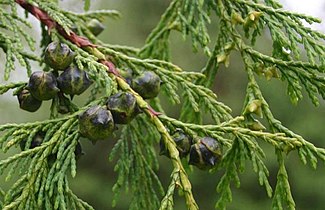Cypress
Appearance
Cypress is a common name for various coniferous trees or shrubs of northern temperate regions that belong to the family Cupressaceae. The word cypress is derived from Old French cipres, which was imported from Latin cypressus, the latinisation of the Greek κυπάρισσος (kyparissos).[1][2] Cypress trees are a large classification of conifers, encompassing the trees and shrubs from the cypress family (Cupressaceae) and many others with the word cypress in their common name. Many cypress trees have needle-like, evergreen foliage and acorn-like seed cones.
Species
Species that are commonly known as cypresses include:
- Cypress (multiple species within the genus Cupressus)
Otherwise:
- African cypress (Widdringtonia species), native to Southern Africa[3]
- Bald, Pond, and Montezuma cypresses (Taxodium species), native to North America
- Chinese swamp cypress (Glyptostrobus pensilis), Vietnam, critically endangered[4]
- Cordilleran cypress (Austrocedrus chilensis), native to Chile and Argentina[5]
- Cypress-pines (Actinostrobus species), southwestern Australia[6]
- Cypress-pines (Callitris species), Australia and New Caledonia[7]
- False cypress (Chamaecyparis species), Asia and North America.[8]
- Fujian cypress (Fokienia hodginsii), southeastern China[9]
- Guaitecas cypress (Pilgerodendron uviferum), western Patagonia[10] and Tierra del Fuego[5]
- Japanese cypress (Chamaecyparis obtusa), East Asia
- Patagonian cypress (Fitzroya cupressoides), southern Chile and Argentina
- Mediterranean cypress (Cupressus sempervirens), famous for its longevity, popular garden plant
- Monterey cypress (Cupressus macrocarpa), native to the Monterey Peninsula, California[11]
- Nootka cypress (Cupressus nootkatensis), native to the Pacific Northwest of North America[12]
- Siberian cypress (Microbiota decussata)
- Summer cypress (Bassia scoparia), in the family Amaranthaceae
- Western red cedar (Thuja plicata), native to North America.
The family Cupressaceae also contains 13–16 other genera (not listed above) that do not bear cypress in their common names.
Plants named cypress
-
Cupressus macrocarpa, Monterey Peninsula, California
-
Glyptostrobus pensilis foliage
-
Taxodium ascendens, Okefenokee Swamp, Georgia (USA)
-
Widdringtonia whytei, Malawi
See also
References
- ^ κυπάρισσος, Henry George Liddell, Robert Scott, A Greek-English Lexicon, on Perseus Digital Library
- ^ "Online Etymology Dictionary". www.etymonline.com.
- ^ Pauw, C.A.; Linder, H.P. (1997). "Widdringtonia systematics, ecology and conservation status". Bot. J. Linn. Soc. 123: 297–319. doi:10.1111/j.1095-8339.1997.tb01421.x.
- ^ Thomas, P.; Yang, Y.; Farjon, A.; Nguyen, D. & Liao, W. (2011). "Glyptostrobus pensilis". IUCN Red List of Threatened Species. 2011: e.T32312A9695181. doi:10.2305/IUCN.UK.2011-2.RLTS.T32312A9695181.en. Retrieved 9 January 2018.
- ^ a b Farjon, A. (2005). Monograph of Cupressaceae and Sciadopitys. Royal Botanic Gardens, Kew. ISBN 1-84246-068-4.
- ^ "Actinostrobus". Flora of Australia Online. Department of the Environment and Heritage, Australian Government.
- ^ "Callitris". Kew World Checklist of Selected Plant Families.
- ^ "Chamaecyparis". Kew World Checklist of Selected Plant Families.
- ^ Thomas, P.; Yang, Y. (2013). "Chamaecyparis hodginsii". IUCN Red List of Threatened Species. 2013: e.T32351A2815809. doi:10.2305/IUCN.UK.2013-1.RLTS.T32351A2815809.en. Retrieved 12 November 2021.
- ^ Luebert, Federico; Pliscoff, Patricio (2017) [2006]. Sinopsis bioclimática y vegetacional de Chile (in Spanish) (2nd ed.). Santiago de Chile: Editorial Universitaria. pp. 192–195 and 208–209. ISBN 978-956-11-2575-9.
- ^ Hogan, C. Michael; Frankis, Michael P. (2009). "Monterey Cypress: Cupressus macrocarpa". GlobalTwitcher.com. Archived from the original on 2017-09-06. Retrieved 2017-03-17.
- ^ "Cupressus nootkatensis". PLANTS Database. United States Department of Agriculture; Natural Resources Conservation Service. 2015.













